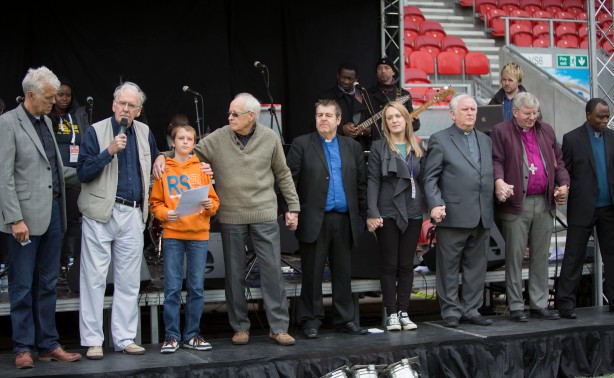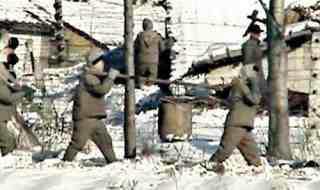One of the many “culture shock” moments for me returning from China is the tribal nature of the church in London. One of the joys of living and working in Beijing is that although there are many limits on Christian meetings, the foreign believers are forced to mingle together at BICF, Beijing International Christian Fellowship. This means that I have spent the last 9 years not only working with Chinese friends in the house churches and state sponsored churches, I have also had the joy of fellowship with friends from the Assemblies of God, Old German Baptist, Southern Baptist, Presbyterian, Acts 29, Charismatic, Conservative, Korean, African, Pacific Island, Russian, Singaporean, European, American, Latin American church groupings (to name but a few). Here in London most Christians keep to our own cliques. This is a pity because it displays disunity when we should be distinctive to the world because of our love for one another. We make the problem worse by spending our time criticising every other group and worrying whether anyone outside our grouping is really a Christian. The entire African church is sometimes written off as “prosperity gospel”, the charismatics are too “feeling orientated”, the conservatives are “quenching the Spirit”, the Koreans are “workaholics”, etc.
In Ephesians 3, Paul explains that he has been given a ministry to Gentiles so that the church will display to the all the “manifold wisdom of God” Eph 3:10. This word manifold, πολυποίκιλος means multi-faceted, diverse, many sided. The context , Paul’s discussion of his mission to the Gentiles, suggests a sense that God’s church displays the diverse, muti-coloured nature of his plan for the world. We fail to display this πολυποίκιλος beauty when we remain in our church ghettos. Worse, we fail to show the distinctive Christ-like love for which the church should be famous. Christ’s love is sacrificial, steadfast, culture-crossing. Clique love is self-serving, fickle, and aimed at people similar to ourselves. Even the businessmen at the golf club know how to invite golfing friends over for dinner and drinks. If the extent of our fellowship is inviting people just like ourselves over for dinner and drinks to extend our social network then we are not showing Christ-like love, we are showing world-like love. Finally clique churches will tend to be more faddish, and less creative. Each visit from China to the UK I have spotted new church fads because we are all reading the same recommended books and attending the same annual conferences. Diverse congregations have a much wider group of opinion sources. They will tend to have more creative conflict and may even break apart under the weight of that conflict, but they will benefit from having less “groupthink” and more innovative solutions to long standing problems.
So how can we learn to be more inclusive without watering down our doctrinal statements or distinctive values?
One way is to reach out into the diversity of the community in which we find ourselves. South Asian origin kids make up something like 15% of London’s schools. London’s Christians need to be making friendships across those cultural boundaries at the school gate. Polish immigrants arrived in 2004 and Romanians are arriving as I write. Our churches need to be reaching out to these people groups for our good as well as theirs.

Fast growing churches tend to be made up of young graduates. Young people in the church need to be encouraged to visit and befriend the elderly in their neighbourhood.
Many Christians (especially those reading this blog) will be getting new ideas and forging connections online. We need to make a conscious effort to listen to voices outside our usual cliques and groupings and make connections with people from different racial, economic, and age backgrounds.
A church which is welcoming to a diverse community will have diversity in its leadership. People tend to attend a church where the people down the front of the church look a bit like themselves. Planting a church of 100 young middle class graduates onto a housing estate is a noble thing to do, but it is likely to be more effective to start a church with a dozen local people and only half a dozen of the graduates, and then encourage the local people to take responsibility for the singing, praying, and welcoming. A big, “white”, Anglican city centre church on the other hand will benefit by adding leaders from Asian or African backgrounds to the leadership teams.
Making friends cross-culturally can be a source of great joy. One of the wonderful aspects of living in a city like London is that I can have Korean, Indian, Nigerian, young, old, rich, poor friends and we can learn from eachother’s diverse experiences. We need to be ready to widen the cultural makeup of our network of Christian friends if we want to display the multicoloured beauty of God’s Church. It is not so hard, but it requires patient, humble, sacrificial love. It is the Holy Spirit that pours this love into our heart, and that is why Christians love is distinctive. As we pray for a deeper love for our neighbours of all backgrounds we shouldn’t be surprised when we have opportunities to love the elderly, the foreign, the poor, the marginalised. They are all around us but we haven’t been looking.
Here is an exercise for you. Have a look at the people you follow on Facebook or Twitter. Count up 100 and see how many of them are from a different economic, racial, age background. If less than 20% are different from you then you need to ask if you are engaging with society or hiding in your clique.





